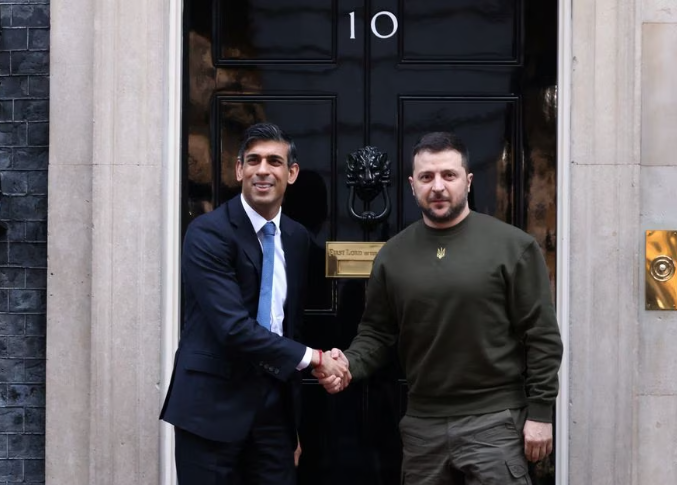
(Reuters) – Ukrainian President Volodymyr Zelenskiy visited Britain on Wednesday to drum up aid, winning a pledge to train Ukrainian pilots on advanced NATO fighter jets, a big symbolic step up in Western military support against Russia’s invasion.
On just his second trip abroad since Russian forces swept into Ukraine on Feb. 24 last year, he met Prime Minister Rishi Sunak and thanked Britain for “marching with us towards the most important victory of our lifetime”. But he repeatedly hammered home a call for combat aircraft, which he referred to as “wings for freedom”.
Ukraine “will do everything possible and impossible to make the world provide us with modern planes to empower and protect pilots who will be protecting us,” Zelenskiy told hundreds of British lawmakers in London’s Westminster Hall.
Shortly before his arrival, Sunak’s office announced plans to expand a programme training Ukraine’s military to include its air force, “to ensure pilots are able to fly sophisticated NATO-standard fighter jets in the future”. The announcement gave no time frame and stopped short of a commitment to provide Kyiv with British jets. But it signalled a notable shift in support that could pave the way for other countries to send planes, so far ruled out by countries wary of sending weapons capable of striking deep into Russia.
Closing his remarks, Zelenskiy said two years ago he had left the British parliament thanking lawmakers for “delicious English tea”; now he would leave “thanking you in advance for powerful English planes”.
As he wrapped up his speech in London, air raid sirens rang out in the Ukrainian capital Kyiv.
Sunak told parliament that Britain would give Ukraine the support it needs “to ensure a decisive military victory on the battlefield this year”.
Zelenskiy was also due to meet King Charles and visit Ukrainian troops training in Britain, before travelling on to Brussels, where he is expected to attend a summit of European Union leaders.
During his UK visit, Britain announced the addition of new names to its Russia sanctions blacklist, as well as plans to accelerate the supply of military equipment to Kyiv, including unspecified longer range weapons.
Last month Britain was the first Western country to offer battle tanks, pledging 14 of them a little more than a week before the United States and European allies pledged scores.
German Chancellor Olaf Scholz, publicly more cautious than some other Western leaders on arms deliveries, told lawmakers in Berlin decisions on weapons were best when coordinated behind the scenes, rather than announced separately by countries in a “public competition to outdo each other”. Scholz also said he expected strong demonstrations of support for Ukraine from this week’s EU summit, and a new round of European sanctions on Russia around the anniversary of the invasion.






